Analysis of Indigenous and Torres Strait Islander History and Culture
VerifiedAdded on 2020/06/04
|8
|2229
|64
Essay
AI Summary
This essay delves into the diverse culture and history of the Torres Strait Islander people, highlighting their unique identities and traditions, and differentiating them from Aboriginal Australians. It examines the impact of European settlement, focusing on socio-economic issues such as land loss and cultural heritage disruption. The essay analyzes values of law and kinship, the effects of racism and discrimination, and the evolution of power relations. It also explores the impact of Western systems and structures, including healthcare, education, and employment, on Indigenous communities, and discusses the effects of racial trauma on individual decision-making. The essay concludes by emphasizing the lasting impact of colonialism on the lives of Indigenous and Torres Strait Islander peoples, underscoring the importance of understanding their history and ongoing challenges.
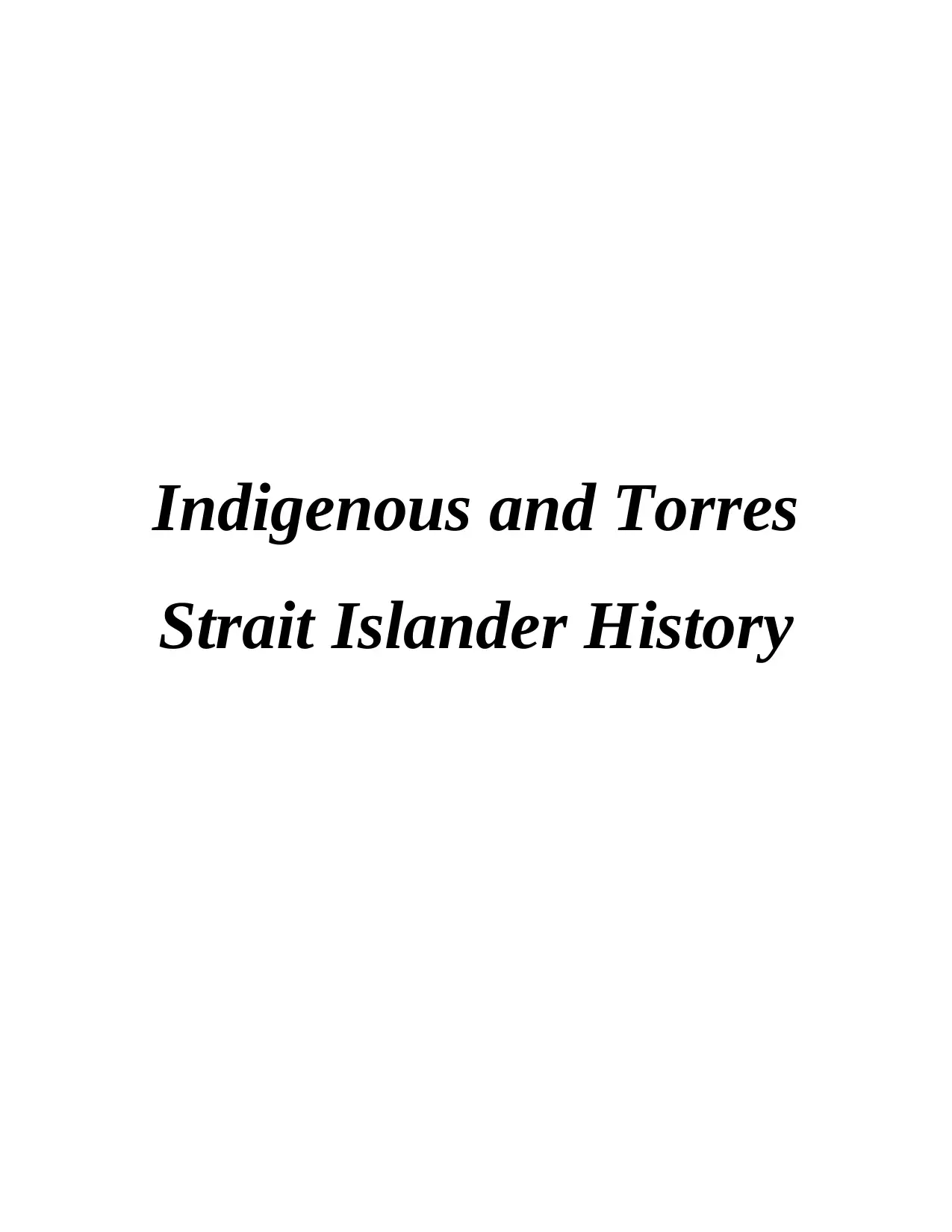
Indigenous and Torres
Strait Islander History
Strait Islander History
Paraphrase This Document
Need a fresh take? Get an instant paraphrase of this document with our AI Paraphraser
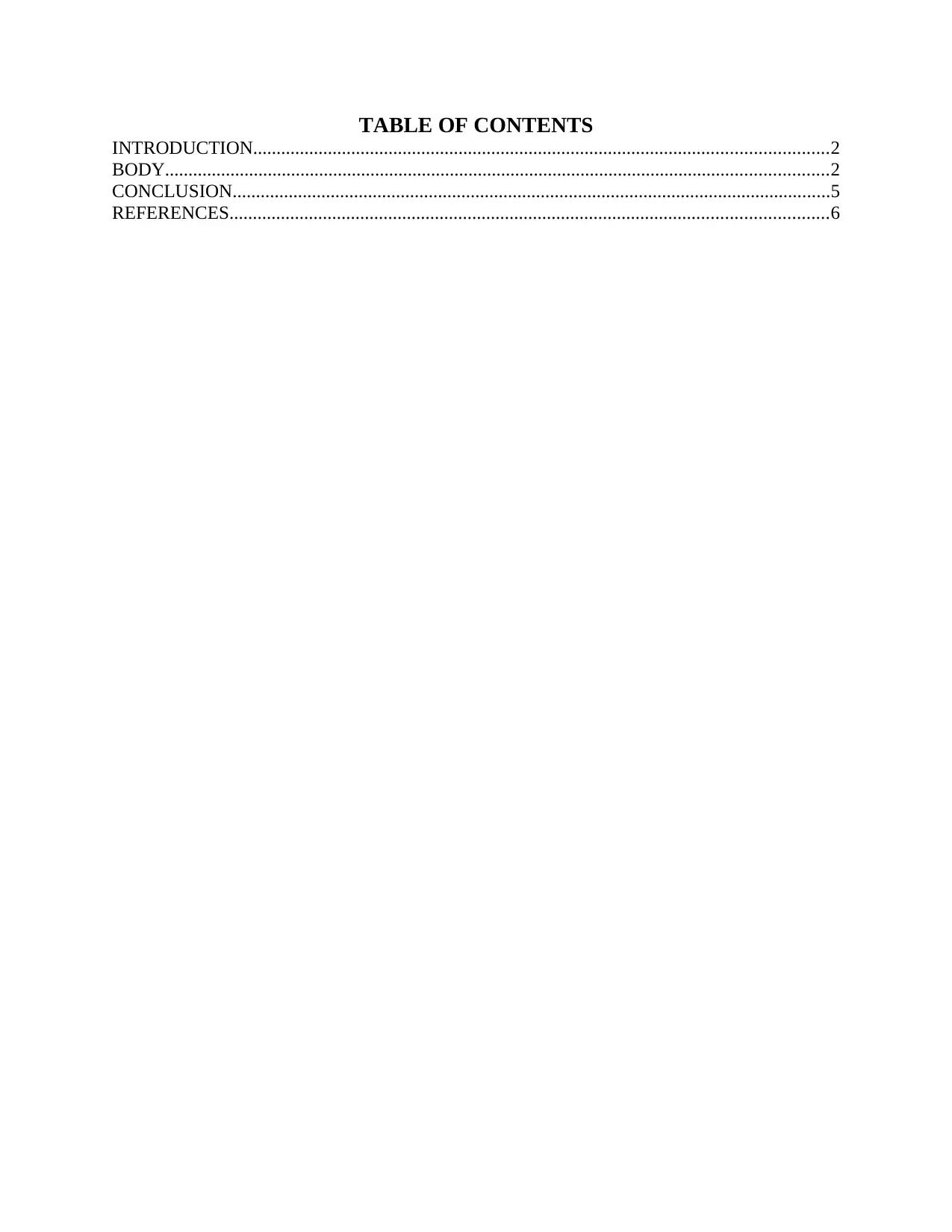
TABLE OF CONTENTS
INTRODUCTION...........................................................................................................................2
BODY..............................................................................................................................................2
CONCLUSION................................................................................................................................5
REFERENCES................................................................................................................................6
INTRODUCTION...........................................................................................................................2
BODY..............................................................................................................................................2
CONCLUSION................................................................................................................................5
REFERENCES................................................................................................................................6
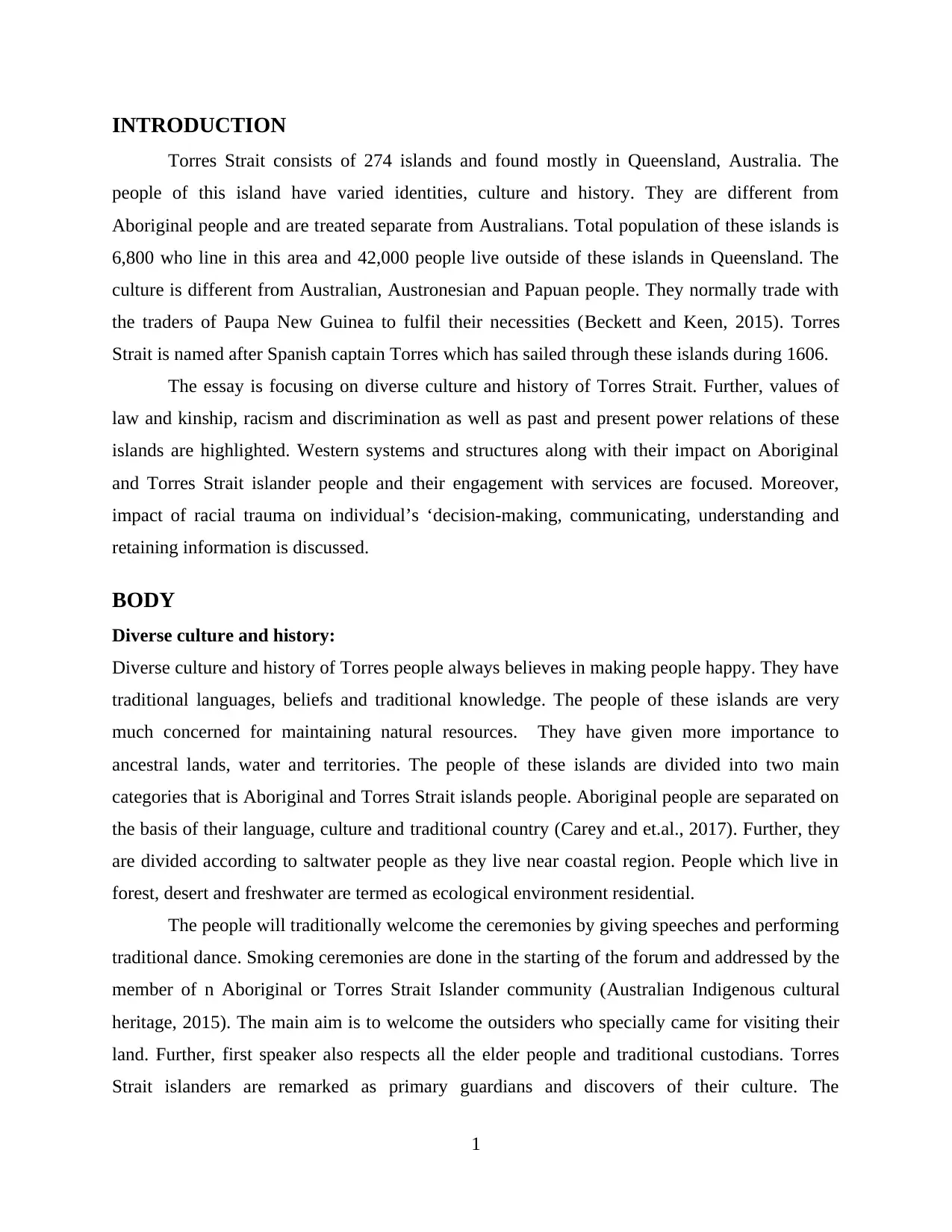
INTRODUCTION
Torres Strait consists of 274 islands and found mostly in Queensland, Australia. The
people of this island have varied identities, culture and history. They are different from
Aboriginal people and are treated separate from Australians. Total population of these islands is
6,800 who line in this area and 42,000 people live outside of these islands in Queensland. The
culture is different from Australian, Austronesian and Papuan people. They normally trade with
the traders of Paupa New Guinea to fulfil their necessities (Beckett and Keen, 2015). Torres
Strait is named after Spanish captain Torres which has sailed through these islands during 1606.
The essay is focusing on diverse culture and history of Torres Strait. Further, values of
law and kinship, racism and discrimination as well as past and present power relations of these
islands are highlighted. Western systems and structures along with their impact on Aboriginal
and Torres Strait islander people and their engagement with services are focused. Moreover,
impact of racial trauma on individual’s ‘decision-making, communicating, understanding and
retaining information is discussed.
BODY
Diverse culture and history:
Diverse culture and history of Torres people always believes in making people happy. They have
traditional languages, beliefs and traditional knowledge. The people of these islands are very
much concerned for maintaining natural resources. They have given more importance to
ancestral lands, water and territories. The people of these islands are divided into two main
categories that is Aboriginal and Torres Strait islands people. Aboriginal people are separated on
the basis of their language, culture and traditional country (Carey and et.al., 2017). Further, they
are divided according to saltwater people as they live near coastal region. People which live in
forest, desert and freshwater are termed as ecological environment residential.
The people will traditionally welcome the ceremonies by giving speeches and performing
traditional dance. Smoking ceremonies are done in the starting of the forum and addressed by the
member of n Aboriginal or Torres Strait Islander community (Australian Indigenous cultural
heritage, 2015). The main aim is to welcome the outsiders who specially came for visiting their
land. Further, first speaker also respects all the elder people and traditional custodians. Torres
Strait islanders are remarked as primary guardians and discovers of their culture. The
1
Torres Strait consists of 274 islands and found mostly in Queensland, Australia. The
people of this island have varied identities, culture and history. They are different from
Aboriginal people and are treated separate from Australians. Total population of these islands is
6,800 who line in this area and 42,000 people live outside of these islands in Queensland. The
culture is different from Australian, Austronesian and Papuan people. They normally trade with
the traders of Paupa New Guinea to fulfil their necessities (Beckett and Keen, 2015). Torres
Strait is named after Spanish captain Torres which has sailed through these islands during 1606.
The essay is focusing on diverse culture and history of Torres Strait. Further, values of
law and kinship, racism and discrimination as well as past and present power relations of these
islands are highlighted. Western systems and structures along with their impact on Aboriginal
and Torres Strait islander people and their engagement with services are focused. Moreover,
impact of racial trauma on individual’s ‘decision-making, communicating, understanding and
retaining information is discussed.
BODY
Diverse culture and history:
Diverse culture and history of Torres people always believes in making people happy. They have
traditional languages, beliefs and traditional knowledge. The people of these islands are very
much concerned for maintaining natural resources. They have given more importance to
ancestral lands, water and territories. The people of these islands are divided into two main
categories that is Aboriginal and Torres Strait islands people. Aboriginal people are separated on
the basis of their language, culture and traditional country (Carey and et.al., 2017). Further, they
are divided according to saltwater people as they live near coastal region. People which live in
forest, desert and freshwater are termed as ecological environment residential.
The people will traditionally welcome the ceremonies by giving speeches and performing
traditional dance. Smoking ceremonies are done in the starting of the forum and addressed by the
member of n Aboriginal or Torres Strait Islander community (Australian Indigenous cultural
heritage, 2015). The main aim is to welcome the outsiders who specially came for visiting their
land. Further, first speaker also respects all the elder people and traditional custodians. Torres
Strait islanders are remarked as primary guardians and discovers of their culture. The
1
⊘ This is a preview!⊘
Do you want full access?
Subscribe today to unlock all pages.

Trusted by 1+ million students worldwide
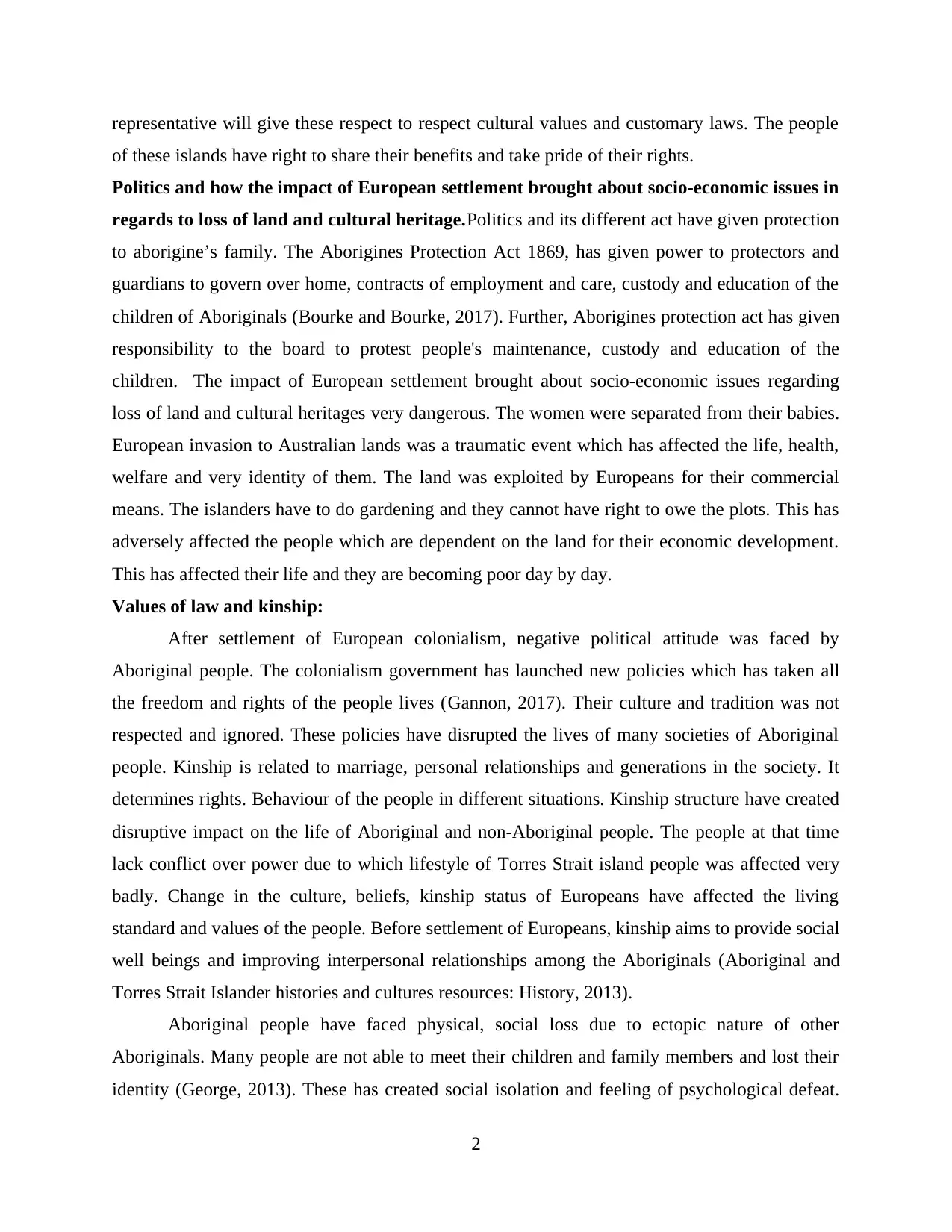
representative will give these respect to respect cultural values and customary laws. The people
of these islands have right to share their benefits and take pride of their rights.
Politics and how the impact of European settlement brought about socio-economic issues in
regards to loss of land and cultural heritage.Politics and its different act have given protection
to aborigine’s family. The Aborigines Protection Act 1869, has given power to protectors and
guardians to govern over home, contracts of employment and care, custody and education of the
children of Aboriginals (Bourke and Bourke, 2017). Further, Aborigines protection act has given
responsibility to the board to protest people's maintenance, custody and education of the
children. The impact of European settlement brought about socio-economic issues regarding
loss of land and cultural heritages very dangerous. The women were separated from their babies.
European invasion to Australian lands was a traumatic event which has affected the life, health,
welfare and very identity of them. The land was exploited by Europeans for their commercial
means. The islanders have to do gardening and they cannot have right to owe the plots. This has
adversely affected the people which are dependent on the land for their economic development.
This has affected their life and they are becoming poor day by day.
Values of law and kinship:
After settlement of European colonialism, negative political attitude was faced by
Aboriginal people. The colonialism government has launched new policies which has taken all
the freedom and rights of the people lives (Gannon, 2017). Their culture and tradition was not
respected and ignored. These policies have disrupted the lives of many societies of Aboriginal
people. Kinship is related to marriage, personal relationships and generations in the society. It
determines rights. Behaviour of the people in different situations. Kinship structure have created
disruptive impact on the life of Aboriginal and non-Aboriginal people. The people at that time
lack conflict over power due to which lifestyle of Torres Strait island people was affected very
badly. Change in the culture, beliefs, kinship status of Europeans have affected the living
standard and values of the people. Before settlement of Europeans, kinship aims to provide social
well beings and improving interpersonal relationships among the Aboriginals (Aboriginal and
Torres Strait Islander histories and cultures resources: History, 2013).
Aboriginal people have faced physical, social loss due to ectopic nature of other
Aboriginals. Many people are not able to meet their children and family members and lost their
identity (George, 2013). These has created social isolation and feeling of psychological defeat.
2
of these islands have right to share their benefits and take pride of their rights.
Politics and how the impact of European settlement brought about socio-economic issues in
regards to loss of land and cultural heritage.Politics and its different act have given protection
to aborigine’s family. The Aborigines Protection Act 1869, has given power to protectors and
guardians to govern over home, contracts of employment and care, custody and education of the
children of Aboriginals (Bourke and Bourke, 2017). Further, Aborigines protection act has given
responsibility to the board to protest people's maintenance, custody and education of the
children. The impact of European settlement brought about socio-economic issues regarding
loss of land and cultural heritages very dangerous. The women were separated from their babies.
European invasion to Australian lands was a traumatic event which has affected the life, health,
welfare and very identity of them. The land was exploited by Europeans for their commercial
means. The islanders have to do gardening and they cannot have right to owe the plots. This has
adversely affected the people which are dependent on the land for their economic development.
This has affected their life and they are becoming poor day by day.
Values of law and kinship:
After settlement of European colonialism, negative political attitude was faced by
Aboriginal people. The colonialism government has launched new policies which has taken all
the freedom and rights of the people lives (Gannon, 2017). Their culture and tradition was not
respected and ignored. These policies have disrupted the lives of many societies of Aboriginal
people. Kinship is related to marriage, personal relationships and generations in the society. It
determines rights. Behaviour of the people in different situations. Kinship structure have created
disruptive impact on the life of Aboriginal and non-Aboriginal people. The people at that time
lack conflict over power due to which lifestyle of Torres Strait island people was affected very
badly. Change in the culture, beliefs, kinship status of Europeans have affected the living
standard and values of the people. Before settlement of Europeans, kinship aims to provide social
well beings and improving interpersonal relationships among the Aboriginals (Aboriginal and
Torres Strait Islander histories and cultures resources: History, 2013).
Aboriginal people have faced physical, social loss due to ectopic nature of other
Aboriginals. Many people are not able to meet their children and family members and lost their
identity (George, 2013). These has created social isolation and feeling of psychological defeat.
2
Paraphrase This Document
Need a fresh take? Get an instant paraphrase of this document with our AI Paraphraser
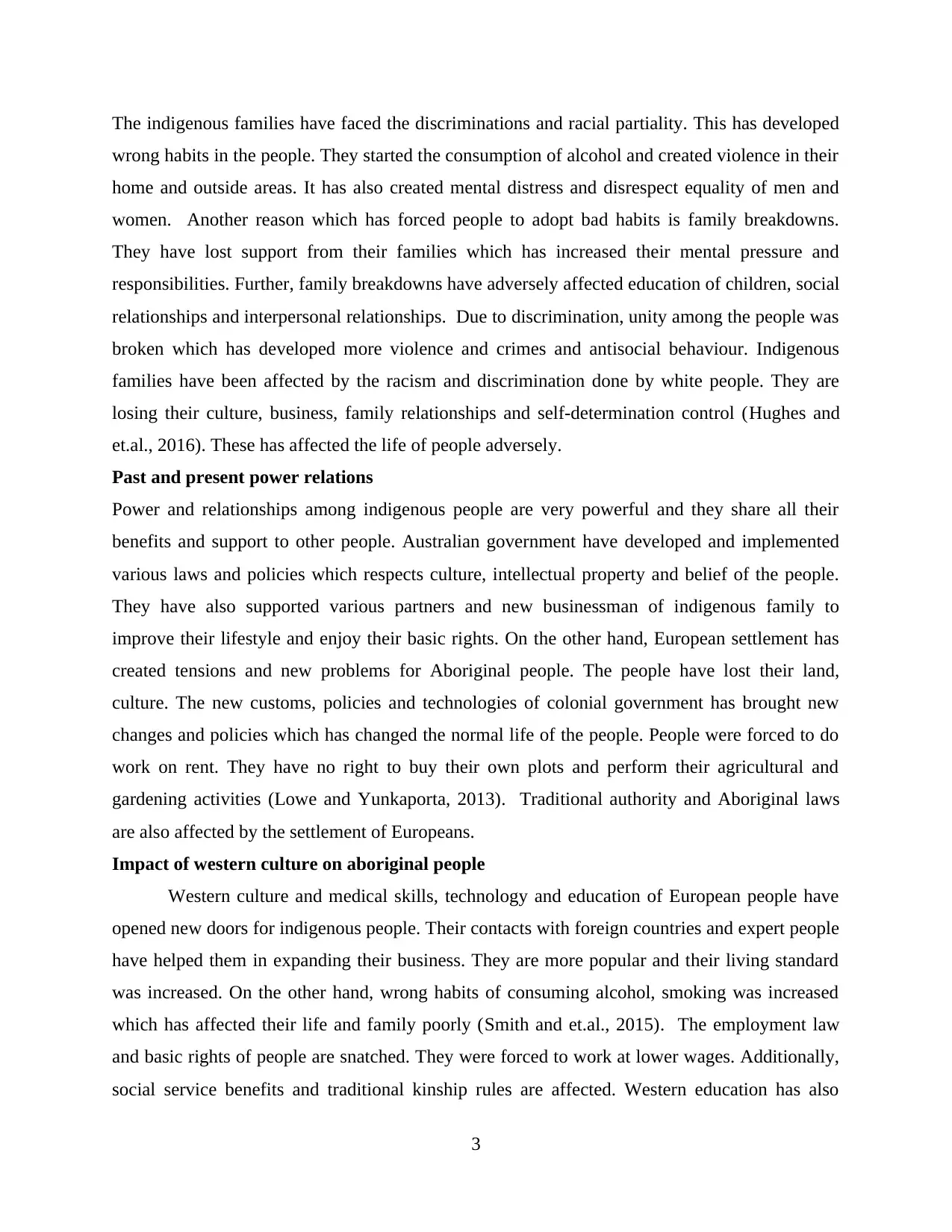
The indigenous families have faced the discriminations and racial partiality. This has developed
wrong habits in the people. They started the consumption of alcohol and created violence in their
home and outside areas. It has also created mental distress and disrespect equality of men and
women. Another reason which has forced people to adopt bad habits is family breakdowns.
They have lost support from their families which has increased their mental pressure and
responsibilities. Further, family breakdowns have adversely affected education of children, social
relationships and interpersonal relationships. Due to discrimination, unity among the people was
broken which has developed more violence and crimes and antisocial behaviour. Indigenous
families have been affected by the racism and discrimination done by white people. They are
losing their culture, business, family relationships and self-determination control (Hughes and
et.al., 2016). These has affected the life of people adversely.
Past and present power relations
Power and relationships among indigenous people are very powerful and they share all their
benefits and support to other people. Australian government have developed and implemented
various laws and policies which respects culture, intellectual property and belief of the people.
They have also supported various partners and new businessman of indigenous family to
improve their lifestyle and enjoy their basic rights. On the other hand, European settlement has
created tensions and new problems for Aboriginal people. The people have lost their land,
culture. The new customs, policies and technologies of colonial government has brought new
changes and policies which has changed the normal life of the people. People were forced to do
work on rent. They have no right to buy their own plots and perform their agricultural and
gardening activities (Lowe and Yunkaporta, 2013). Traditional authority and Aboriginal laws
are also affected by the settlement of Europeans.
Impact of western culture on aboriginal people
Western culture and medical skills, technology and education of European people have
opened new doors for indigenous people. Their contacts with foreign countries and expert people
have helped them in expanding their business. They are more popular and their living standard
was increased. On the other hand, wrong habits of consuming alcohol, smoking was increased
which has affected their life and family poorly (Smith and et.al., 2015). The employment law
and basic rights of people are snatched. They were forced to work at lower wages. Additionally,
social service benefits and traditional kinship rules are affected. Western education has also
3
wrong habits in the people. They started the consumption of alcohol and created violence in their
home and outside areas. It has also created mental distress and disrespect equality of men and
women. Another reason which has forced people to adopt bad habits is family breakdowns.
They have lost support from their families which has increased their mental pressure and
responsibilities. Further, family breakdowns have adversely affected education of children, social
relationships and interpersonal relationships. Due to discrimination, unity among the people was
broken which has developed more violence and crimes and antisocial behaviour. Indigenous
families have been affected by the racism and discrimination done by white people. They are
losing their culture, business, family relationships and self-determination control (Hughes and
et.al., 2016). These has affected the life of people adversely.
Past and present power relations
Power and relationships among indigenous people are very powerful and they share all their
benefits and support to other people. Australian government have developed and implemented
various laws and policies which respects culture, intellectual property and belief of the people.
They have also supported various partners and new businessman of indigenous family to
improve their lifestyle and enjoy their basic rights. On the other hand, European settlement has
created tensions and new problems for Aboriginal people. The people have lost their land,
culture. The new customs, policies and technologies of colonial government has brought new
changes and policies which has changed the normal life of the people. People were forced to do
work on rent. They have no right to buy their own plots and perform their agricultural and
gardening activities (Lowe and Yunkaporta, 2013). Traditional authority and Aboriginal laws
are also affected by the settlement of Europeans.
Impact of western culture on aboriginal people
Western culture and medical skills, technology and education of European people have
opened new doors for indigenous people. Their contacts with foreign countries and expert people
have helped them in expanding their business. They are more popular and their living standard
was increased. On the other hand, wrong habits of consuming alcohol, smoking was increased
which has affected their life and family poorly (Smith and et.al., 2015). The employment law
and basic rights of people are snatched. They were forced to work at lower wages. Additionally,
social service benefits and traditional kinship rules are affected. Western education has also
3
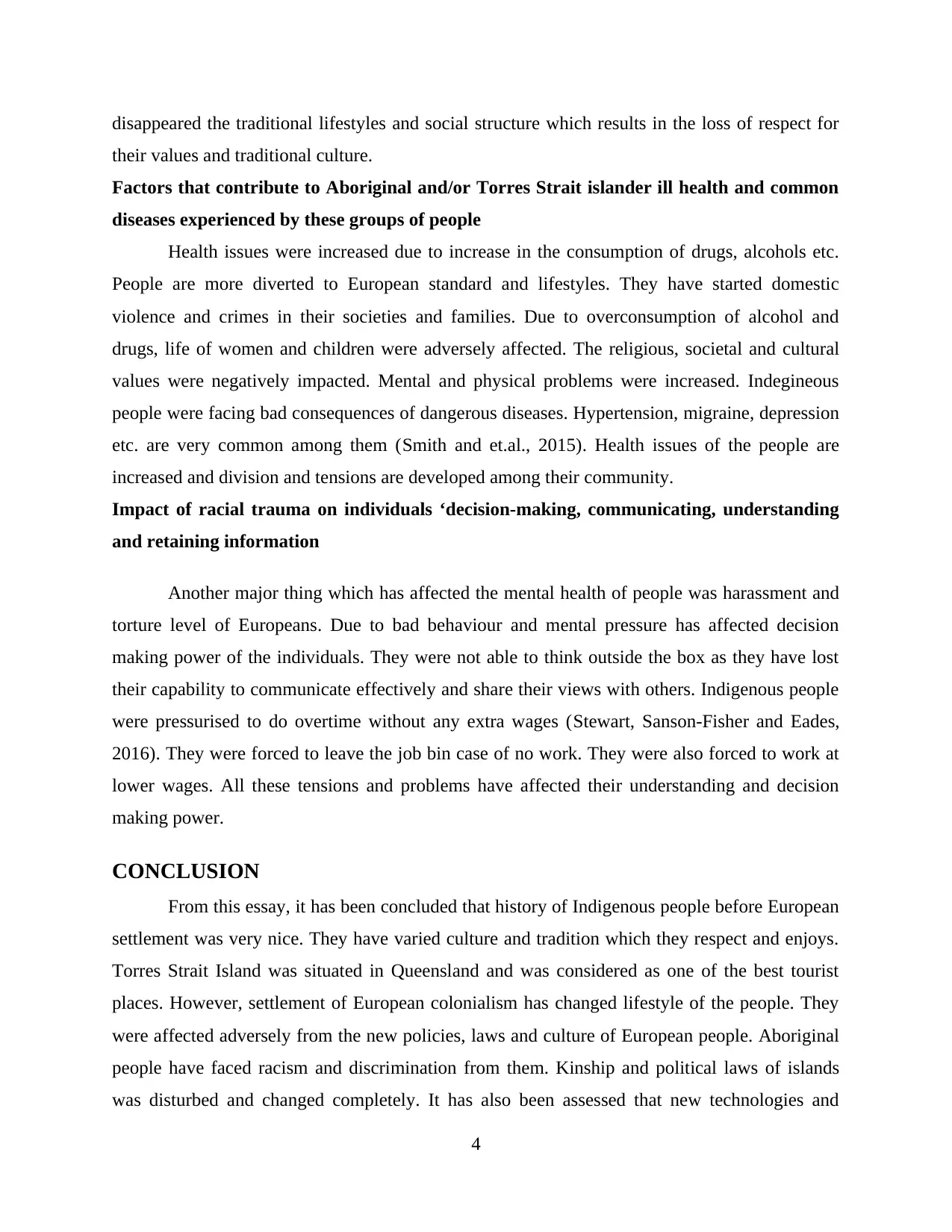
disappeared the traditional lifestyles and social structure which results in the loss of respect for
their values and traditional culture.
Factors that contribute to Aboriginal and/or Torres Strait islander ill health and common
diseases experienced by these groups of people
Health issues were increased due to increase in the consumption of drugs, alcohols etc.
People are more diverted to European standard and lifestyles. They have started domestic
violence and crimes in their societies and families. Due to overconsumption of alcohol and
drugs, life of women and children were adversely affected. The religious, societal and cultural
values were negatively impacted. Mental and physical problems were increased. Indegineous
people were facing bad consequences of dangerous diseases. Hypertension, migraine, depression
etc. are very common among them (Smith and et.al., 2015). Health issues of the people are
increased and division and tensions are developed among their community.
Impact of racial trauma on individuals ‘decision-making, communicating, understanding
and retaining information
Another major thing which has affected the mental health of people was harassment and
torture level of Europeans. Due to bad behaviour and mental pressure has affected decision
making power of the individuals. They were not able to think outside the box as they have lost
their capability to communicate effectively and share their views with others. Indigenous people
were pressurised to do overtime without any extra wages (Stewart, Sanson‐Fisher and Eades,
2016). They were forced to leave the job bin case of no work. They were also forced to work at
lower wages. All these tensions and problems have affected their understanding and decision
making power.
CONCLUSION
From this essay, it has been concluded that history of Indigenous people before European
settlement was very nice. They have varied culture and tradition which they respect and enjoys.
Torres Strait Island was situated in Queensland and was considered as one of the best tourist
places. However, settlement of European colonialism has changed lifestyle of the people. They
were affected adversely from the new policies, laws and culture of European people. Aboriginal
people have faced racism and discrimination from them. Kinship and political laws of islands
was disturbed and changed completely. It has also been assessed that new technologies and
4
their values and traditional culture.
Factors that contribute to Aboriginal and/or Torres Strait islander ill health and common
diseases experienced by these groups of people
Health issues were increased due to increase in the consumption of drugs, alcohols etc.
People are more diverted to European standard and lifestyles. They have started domestic
violence and crimes in their societies and families. Due to overconsumption of alcohol and
drugs, life of women and children were adversely affected. The religious, societal and cultural
values were negatively impacted. Mental and physical problems were increased. Indegineous
people were facing bad consequences of dangerous diseases. Hypertension, migraine, depression
etc. are very common among them (Smith and et.al., 2015). Health issues of the people are
increased and division and tensions are developed among their community.
Impact of racial trauma on individuals ‘decision-making, communicating, understanding
and retaining information
Another major thing which has affected the mental health of people was harassment and
torture level of Europeans. Due to bad behaviour and mental pressure has affected decision
making power of the individuals. They were not able to think outside the box as they have lost
their capability to communicate effectively and share their views with others. Indigenous people
were pressurised to do overtime without any extra wages (Stewart, Sanson‐Fisher and Eades,
2016). They were forced to leave the job bin case of no work. They were also forced to work at
lower wages. All these tensions and problems have affected their understanding and decision
making power.
CONCLUSION
From this essay, it has been concluded that history of Indigenous people before European
settlement was very nice. They have varied culture and tradition which they respect and enjoys.
Torres Strait Island was situated in Queensland and was considered as one of the best tourist
places. However, settlement of European colonialism has changed lifestyle of the people. They
were affected adversely from the new policies, laws and culture of European people. Aboriginal
people have faced racism and discrimination from them. Kinship and political laws of islands
was disturbed and changed completely. It has also been assessed that new technologies and
4
⊘ This is a preview!⊘
Do you want full access?
Subscribe today to unlock all pages.

Trusted by 1+ million students worldwide
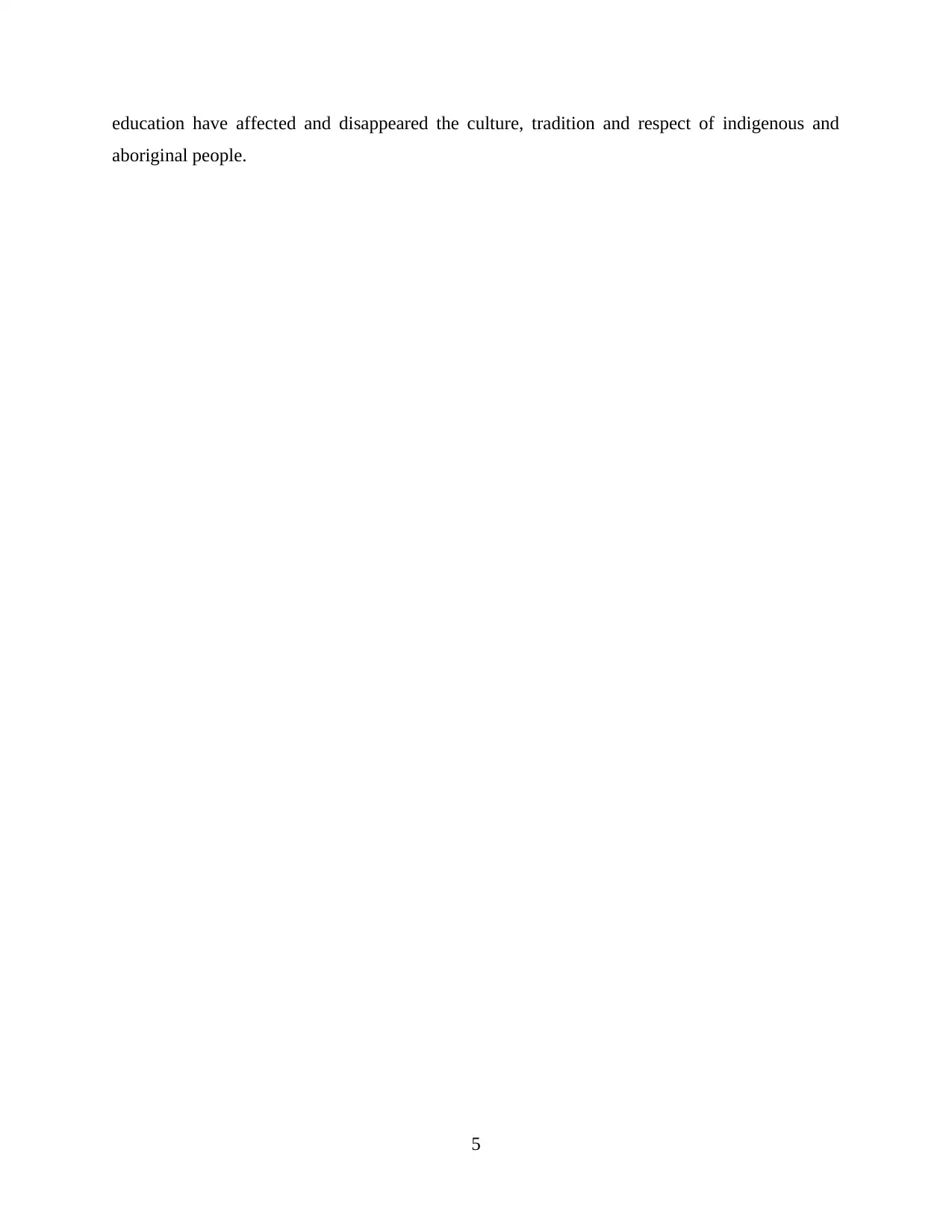
education have affected and disappeared the culture, tradition and respect of indigenous and
aboriginal people.
5
aboriginal people.
5
Paraphrase This Document
Need a fresh take? Get an instant paraphrase of this document with our AI Paraphraser
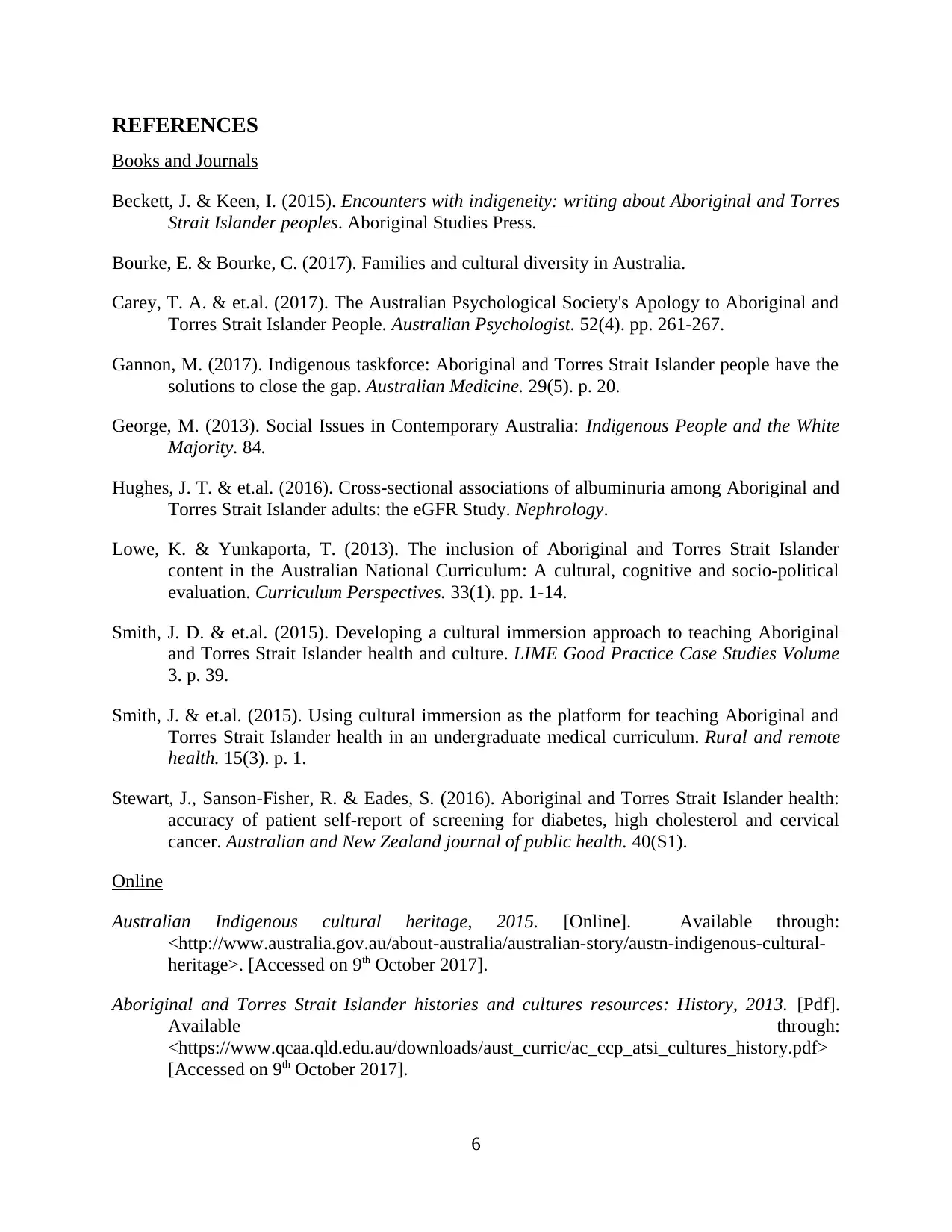
REFERENCES
Books and Journals
Beckett, J. & Keen, I. (2015). Encounters with indigeneity: writing about Aboriginal and Torres
Strait Islander peoples. Aboriginal Studies Press.
Bourke, E. & Bourke, C. (2017). Families and cultural diversity in Australia.
Carey, T. A. & et.al. (2017). The Australian Psychological Society's Apology to Aboriginal and
Torres Strait Islander People. Australian Psychologist. 52(4). pp. 261-267.
Gannon, M. (2017). Indigenous taskforce: Aboriginal and Torres Strait Islander people have the
solutions to close the gap. Australian Medicine. 29(5). p. 20.
George, M. (2013). Social Issues in Contemporary Australia: Indigenous People and the White
Majority. 84.
Hughes, J. T. & et.al. (2016). Cross‐sectional associations of albuminuria among Aboriginal and
Torres Strait Islander adults: the eGFR Study. Nephrology.
Lowe, K. & Yunkaporta, T. (2013). The inclusion of Aboriginal and Torres Strait Islander
content in the Australian National Curriculum: A cultural, cognitive and socio-political
evaluation. Curriculum Perspectives. 33(1). pp. 1-14.
Smith, J. D. & et.al. (2015). Developing a cultural immersion approach to teaching Aboriginal
and Torres Strait Islander health and culture. LIME Good Practice Case Studies Volume
3. p. 39.
Smith, J. & et.al. (2015). Using cultural immersion as the platform for teaching Aboriginal and
Torres Strait Islander health in an undergraduate medical curriculum. Rural and remote
health. 15(3). p. 1.
Stewart, J., Sanson‐Fisher, R. & Eades, S. (2016). Aboriginal and Torres Strait Islander health:
accuracy of patient self‐report of screening for diabetes, high cholesterol and cervical
cancer. Australian and New Zealand journal of public health. 40(S1).
Online
Australian Indigenous cultural heritage, 2015. [Online]. Available through:
<http://www.australia.gov.au/about-australia/australian-story/austn-indigenous-cultural-
heritage>. [Accessed on 9th October 2017].
Aboriginal and Torres Strait Islander histories and cultures resources: History, 2013. [Pdf].
Available through:
<https://www.qcaa.qld.edu.au/downloads/aust_curric/ac_ccp_atsi_cultures_history.pdf>
[Accessed on 9th October 2017].
6
Books and Journals
Beckett, J. & Keen, I. (2015). Encounters with indigeneity: writing about Aboriginal and Torres
Strait Islander peoples. Aboriginal Studies Press.
Bourke, E. & Bourke, C. (2017). Families and cultural diversity in Australia.
Carey, T. A. & et.al. (2017). The Australian Psychological Society's Apology to Aboriginal and
Torres Strait Islander People. Australian Psychologist. 52(4). pp. 261-267.
Gannon, M. (2017). Indigenous taskforce: Aboriginal and Torres Strait Islander people have the
solutions to close the gap. Australian Medicine. 29(5). p. 20.
George, M. (2013). Social Issues in Contemporary Australia: Indigenous People and the White
Majority. 84.
Hughes, J. T. & et.al. (2016). Cross‐sectional associations of albuminuria among Aboriginal and
Torres Strait Islander adults: the eGFR Study. Nephrology.
Lowe, K. & Yunkaporta, T. (2013). The inclusion of Aboriginal and Torres Strait Islander
content in the Australian National Curriculum: A cultural, cognitive and socio-political
evaluation. Curriculum Perspectives. 33(1). pp. 1-14.
Smith, J. D. & et.al. (2015). Developing a cultural immersion approach to teaching Aboriginal
and Torres Strait Islander health and culture. LIME Good Practice Case Studies Volume
3. p. 39.
Smith, J. & et.al. (2015). Using cultural immersion as the platform for teaching Aboriginal and
Torres Strait Islander health in an undergraduate medical curriculum. Rural and remote
health. 15(3). p. 1.
Stewart, J., Sanson‐Fisher, R. & Eades, S. (2016). Aboriginal and Torres Strait Islander health:
accuracy of patient self‐report of screening for diabetes, high cholesterol and cervical
cancer. Australian and New Zealand journal of public health. 40(S1).
Online
Australian Indigenous cultural heritage, 2015. [Online]. Available through:
<http://www.australia.gov.au/about-australia/australian-story/austn-indigenous-cultural-
heritage>. [Accessed on 9th October 2017].
Aboriginal and Torres Strait Islander histories and cultures resources: History, 2013. [Pdf].
Available through:
<https://www.qcaa.qld.edu.au/downloads/aust_curric/ac_ccp_atsi_cultures_history.pdf>
[Accessed on 9th October 2017].
6
1 out of 8
Related Documents
Your All-in-One AI-Powered Toolkit for Academic Success.
+13062052269
info@desklib.com
Available 24*7 on WhatsApp / Email
![[object Object]](/_next/static/media/star-bottom.7253800d.svg)
Unlock your academic potential
Copyright © 2020–2026 A2Z Services. All Rights Reserved. Developed and managed by ZUCOL.





